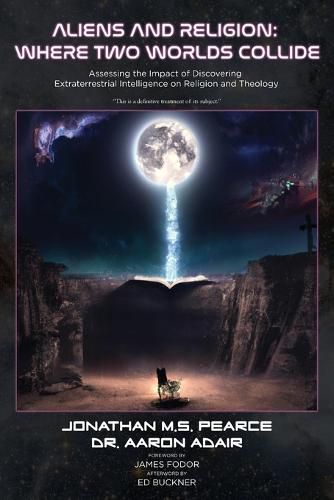Readings Newsletter
Become a Readings Member to make your shopping experience even easier.
Sign in or sign up for free!
You’re not far away from qualifying for FREE standard shipping within Australia
You’ve qualified for FREE standard shipping within Australia
The cart is loading…






This title is printed to order. This book may have been self-published. If so, we cannot guarantee the quality of the content. In the main most books will have gone through the editing process however some may not. We therefore suggest that you be aware of this before ordering this book. If in doubt check either the author or publisher’s details as we are unable to accept any returns unless they are faulty. Please contact us if you have any questions.
How big is the universe? Does intelligent extraterrestrial life exist somewhere in the universe? If so, how much extraterrestrial intelligent life (ETI) might there be? And if it is there, is it moral? Would they have a religion? And what would their existence say about human religions, theology, and beliefs?
In short, is the existence of ETI incompatible with the belief in God, with certain religions and their theologies?
These are the questions that Pearce (a philosopher) and Adair (a scientist who has worked on SETI - the search for ETI) seek to answer in this book. They take a close aim at Christian theology, focusing on previous claims of prominent astrotheologians who claim that there are no considerable problems that ETI existence causes for their belief systems. Pearce and Adair, however, show in this wide-ranging book (that touches on science, philosophy, psychology, and theology) that Christian (and other religious) belief is indeed threatened by the existence of ETI.
Would aliens be fallen creatures, requiring salvation through atonement and the resulting incarnation of God? Would one Jesus suffice, or would the universe require trillions of Jesuses, many existing simultaneously? This, and many other such questions are discussed in this engaging book that adds to the growing discipline of astrotheology (and perhaps astro-atheology).
"This well-written and provocative book is a substantial contribution to studies of the societal impact of
astrobiology, and especially to the new field of astrotheology."
"I love definitive treatments of a subject. This is a definitive treatment of its subject. The impact and significance to religion of even the possibility of alien civilizations is much in need of a thorough look. Pearce and Adair cover every angle, and well."
"The breadth and depth of knowledge in Aliens and Religion are truly impressive..."
"An invaluable and highly entertaining resource for science fiction writers and readers alike, for both believers and
skeptics, and anyone who enjoys wrestling with high-end thought experiments."
"This is an impressive work! It's an ingenious attempt to reach believers who are otherwise impervious to reason,
which has a good chance of succeeding. Bravo!"
"...thoughtful, erudite, and deep dive... Highly recommended for anyone who has ever found themselves
wondering about the possibilities hidden among the stars, and about what might happen if those possibilities
came to Earth."
Humanities, Ferrum College
$9.00 standard shipping within Australia
FREE standard shipping within Australia for orders over $100.00
Express & International shipping calculated at checkout
This title is printed to order. This book may have been self-published. If so, we cannot guarantee the quality of the content. In the main most books will have gone through the editing process however some may not. We therefore suggest that you be aware of this before ordering this book. If in doubt check either the author or publisher’s details as we are unable to accept any returns unless they are faulty. Please contact us if you have any questions.
How big is the universe? Does intelligent extraterrestrial life exist somewhere in the universe? If so, how much extraterrestrial intelligent life (ETI) might there be? And if it is there, is it moral? Would they have a religion? And what would their existence say about human religions, theology, and beliefs?
In short, is the existence of ETI incompatible with the belief in God, with certain religions and their theologies?
These are the questions that Pearce (a philosopher) and Adair (a scientist who has worked on SETI - the search for ETI) seek to answer in this book. They take a close aim at Christian theology, focusing on previous claims of prominent astrotheologians who claim that there are no considerable problems that ETI existence causes for their belief systems. Pearce and Adair, however, show in this wide-ranging book (that touches on science, philosophy, psychology, and theology) that Christian (and other religious) belief is indeed threatened by the existence of ETI.
Would aliens be fallen creatures, requiring salvation through atonement and the resulting incarnation of God? Would one Jesus suffice, or would the universe require trillions of Jesuses, many existing simultaneously? This, and many other such questions are discussed in this engaging book that adds to the growing discipline of astrotheology (and perhaps astro-atheology).
"This well-written and provocative book is a substantial contribution to studies of the societal impact of
astrobiology, and especially to the new field of astrotheology."
"I love definitive treatments of a subject. This is a definitive treatment of its subject. The impact and significance to religion of even the possibility of alien civilizations is much in need of a thorough look. Pearce and Adair cover every angle, and well."
"The breadth and depth of knowledge in Aliens and Religion are truly impressive..."
"An invaluable and highly entertaining resource for science fiction writers and readers alike, for both believers and
skeptics, and anyone who enjoys wrestling with high-end thought experiments."
"This is an impressive work! It's an ingenious attempt to reach believers who are otherwise impervious to reason,
which has a good chance of succeeding. Bravo!"
"...thoughtful, erudite, and deep dive... Highly recommended for anyone who has ever found themselves
wondering about the possibilities hidden among the stars, and about what might happen if those possibilities
came to Earth."
Humanities, Ferrum College